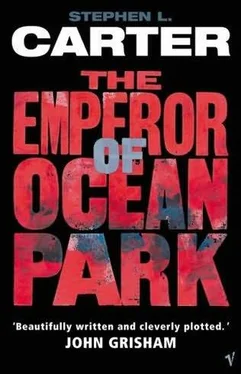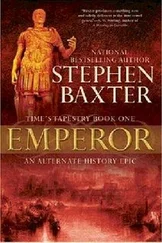Stephen Carter - Emperor of Ocean Park
Здесь есть возможность читать онлайн «Stephen Carter - Emperor of Ocean Park» весь текст электронной книги совершенно бесплатно (целиком полную версию без сокращений). В некоторых случаях можно слушать аудио, скачать через торрент в формате fb2 и присутствует краткое содержание. Жанр: Криминальный детектив, на английском языке. Описание произведения, (предисловие) а так же отзывы посетителей доступны на портале библиотеки ЛибКат.
- Название:Emperor of Ocean Park
- Автор:
- Жанр:
- Год:неизвестен
- ISBN:нет данных
- Рейтинг книги:3 / 5. Голосов: 1
-
Избранное:Добавить в избранное
- Отзывы:
-
Ваша оценка:
- 60
- 1
- 2
- 3
- 4
- 5
Emperor of Ocean Park: краткое содержание, описание и аннотация
Предлагаем к чтению аннотацию, описание, краткое содержание или предисловие (зависит от того, что написал сам автор книги «Emperor of Ocean Park»). Если вы не нашли необходимую информацию о книге — напишите в комментариях, мы постараемся отыскать её.
Emperor of Ocean Park — читать онлайн бесплатно полную книгу (весь текст) целиком
Ниже представлен текст книги, разбитый по страницам. Система сохранения места последней прочитанной страницы, позволяет с удобством читать онлайн бесплатно книгу «Emperor of Ocean Park», без необходимости каждый раз заново искать на чём Вы остановились. Поставьте закладку, и сможете в любой момент перейти на страницу, на которой закончили чтение.
Интервал:
Закладка:
“As the rich get richer,” I whisper uncharitably.
I close the door and sit at the desk. On the bookshelves behind the red leather swivel chair are dozens of scrapbooks, some fancy, some cheap, all bulging with photographs, for my mother was a meticulous chronicler of the family’s life. I pull one out at random and discover a spread of Addison’s baby pictures. A second is of Abby. The page to which it falls open displays her around age ten in Little League uniform, the cap tipped back jauntily on her head, a bat on her shoulder: my parents had to threaten to sue, I remember, before she was allowed to play. The old days. My father, no matter what he was doing, never missed a game. The Judge used to talk about those old days, fondly: the way it was before, he would call it, in odd nostalgic moments, meaning, before Abby died. Nevertheless, he drew his line, put the past in the past, and moved on.
I keep leafing through the albums. A third is full of graduation pictures-mine, Mariah’s, Addison’s, from all levels of our education-along with shots of Mariah and Addison receiving various awards. Especially Addison. None of me, but I have never won anything. Forcing a smile, I keep flipping pages. Most of the book is empty. Space for shots of the grandchildren, perhaps. I put the album away. The next one has the most attractive binder, soft old leather stained a dark blue, and is full of newspaper clippings, all of which seem to be about-
Oh, no.
I close the book quickly and close my eyes slowly and see my father rushing out of the house late on a spring evening, commanding my mother to stay put, Claire, just stay put, we have three other children to worry about, I’ll call you from the hospital! And, later still, my mother answering the phone on the kitchen wall, her hand trembling, then moaning in maternal horror and sagging against the counter, before turning businesslike and distant, which both my parents could do at a snap. I was the lone witness to this display. Mariah and Addison were away at college and Abby was out somewhere; at fifteen, Abby seemed always to be out somewhere, quarreling constantly with our parents. My mother made me dress and hurried me over to a neighbor’s house, even though, at close to seventeen years of age, I was more than capable of staying home unguarded. She left me with quick, desperate kisses, vanishing in the other car on unexplained but obviously tragic business. It was after midnight when my father came to pick me up and sat me down in the living room at Shepard Street and told me in a quivering voice, quite far from his usual radio-announcer tone, that Abby was dead.
From the day of her funeral until the day he died, my father hardly mentioned Abby’s name.
But he kept a scrapbook. A decidedly weird scrapbook I open my eyes once more and leaf through the pages.
And notice at once that something is wrong.
Only the first four clippings have anything to do with Abby. The news story of her death. The formal obituary. A follow-up a week later informing readers that the police had no leads. Another article two months further on reporting the same joyless tidings.
My father was angry in those days, I remember. He was angry all the time. And he began to drink. Alone, the way prominent alcoholics do, locked in this very room. Perhaps poring over this very scrapbook.
I turn the page. The next clipping, dated a few months later, records the death of a small child in a hit-and-run accident in Maryland. I shudder. The following page carries another clipping: a young seminary student, also a hit-and-run victim. I turn and turn. The contents chill me. Page after page of newspaper stories about innocent people killed by hit-and-run drivers, all over the United States. Two, almost three years of them. An elderly woman leaving a supermarket in a small town. A police officer directing traffic in a big city. A rich, politically connected college student, her convertible crushed by a tractor-trailer. A news reporter smashed by a station wagon while changing a flat on a busy highway. A high-school football coach, mangled by a taxi. An impoverished mother of six, a famous writer, a bank clerk, a heart surgeon, a wanted burglar, a teenager on her way to a babysitting job, the son of a prominent politician, a potpourri of American tragedy. Some of the stories bear the inky stamps of the various clipping services that used to send you articles from around the country on a subject of your choice, back before online research; many are no more than tiny one-paragraph items from the Post and the old Star; and a few, very few, are marked with faded blue asterisks and, scribbled in the margins, dates, usually much later than the publication dates of the stories themselves. By working backward from other stories in the album, I soon figure out that the asterisks mark the hit-and-runs in which the driver who did the hitting and running was eventually caught. And a few of the articles about arrests are further annotated with brief, angry notes in my father’s crabbed handwriting: I hope they fry the bastard, or You’d better have a good lawyer, my friend, or At least somebody’s parents got justice.
I flip quickly to the back of the book. The collection ends in the very late seventies, about the time the Judge’s drinking stopped. Makes sense. But nothing else does.
This is not the nostalgic scrapbook of a parent who misses a child; this is the product of a mind obsessed. It strikes me as diabolical in the traditional Christian sense, a thing of the devil. The air around the book seems thick with an aura of mental corruption, as though haunted by the spirit of the madman who assembled it… or the spirit that possessed him to do so. I quickly slide the binder back into its place, fearing that somehow it might infect me with its gleeful lunacy. Odd that it should be sitting here this way, mixed in with the happier memories. Insanity of this sort, even if temporary, is precisely what few children want to know about their parents… and what few parents want their children to know about. The Garlands have many little secrets, and this is among them: when Abby died, my father went a little nuts, and then he got better.
I close my eyes again and sink into the chair. He got better. That is the important thing. He got better. The man we are burying next week is not the man who sat here in this ugly little room, drinking himself insensible night after night, flipping through the pages of this sick scrapbook, terrorizing the family not with anger or violence but with the awful silence of emotional destitution.
He got better.
And yet my fanatically private father preserved this album, the record of his short-lived insanity, where any visitor to the house might blunder across it. I can readily believe that the Judge would have created the scrapbook during his madness, but it seems reckless, out of character, to have held on to it in the years since. All other evidence was discarded years ago. There are, for example, no liquor bottles in the house. The book, however, survives, right on the shelf. Fortunately for my father’s reputation, nobody happened upon the book at the time that the Senate Judiciary Committee was holding its hearings on his-
The door to the little room snaps open. Sally is standing there in her unreasonably tight gray dress, her substantial chest heaving, a rapturous yet somehow helpless smile shining through the tears. She looks slightly confused, as though surprised to find me the first place she looks. Addison has called, she finally announces. Her eyes are alight, ecstatic, sharing her joy. He is on his way, Sally adds happily, oblivious to the possibility that others might not be as thrilled as she. He will be here no later than tomorrow. I blink my eyes, struggling for focus. She sounds like a character out of Beckett. I am on my feet, nodding, blocking the bookcase with my body, absurdly worried that she might get a look at the Judge’s mad scrapbook. Addison is coming, she repeats. Transformed by this news, she has achieved a sudden allure. He will be here soon, Sally assures me. Very soon.
Читать дальшеИнтервал:
Закладка:
Похожие книги на «Emperor of Ocean Park»
Представляем Вашему вниманию похожие книги на «Emperor of Ocean Park» списком для выбора. Мы отобрали схожую по названию и смыслу литературу в надежде предоставить читателям больше вариантов отыскать новые, интересные, ещё непрочитанные произведения.
Обсуждение, отзывы о книге «Emperor of Ocean Park» и просто собственные мнения читателей. Оставьте ваши комментарии, напишите, что Вы думаете о произведении, его смысле или главных героях. Укажите что конкретно понравилось, а что нет, и почему Вы так считаете.












